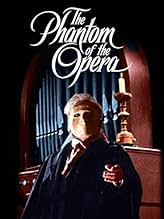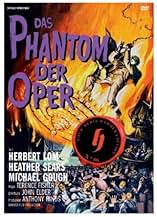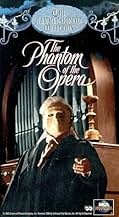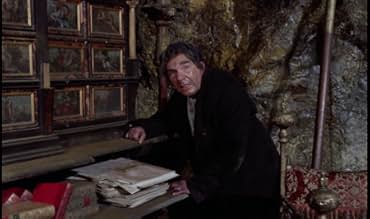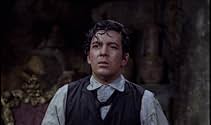IMDb-BEWERTUNG
6,4/10
3981
IHRE BEWERTUNG
Ein säurernarbiger Komponist lässt seinen Zwergenhelfer einen Opernsänger in sein Londoner Kanalversteck bringen.Ein säurernarbiger Komponist lässt seinen Zwergenhelfer einen Opernsänger in sein Londoner Kanalversteck bringen.Ein säurernarbiger Komponist lässt seinen Zwergenhelfer einen Opernsänger in sein Londoner Kanalversteck bringen.
- Regie
- Drehbuch
- Hauptbesetzung
- Auszeichnungen
- 1 Nominierung insgesamt
Miriam Karlin
- Charwoman
- (as Miriam Carlin)
Empfohlene Bewertungen
The novel The Phantom of the Opera has been filmed at least ten times plus now. This entry by Hammer Studios is one of the better ones, bringing a liberal change in storytelling as well as some very atmospheric settings and camera work. Directed by Terence Fisher, this film, like Fisher's The Gorgon, is highly poetic. The phantom is a former music professor who has been pushed into his life of seclusion and physical deformity. He is a figure of sympathetic pity rather than horror. It is this point of view which makes this film very interesting as the phantom is not the monster but rather just a man who has been mistreated trying to cope and resurrect his life. Yep, he still lives in the sewers of Paris. The Hammer sets are wonderful all around, particularly the opera house and the winding underground sewers. Hammer also puts their stamp of luxuriant looking cinematography on. Herbert Lom plays the man behind the mask. Lom does a nice job in the film as do all the leads. Heather Sears is a striking heroine, and Edward Da Souza makes an affable leading man. The real star, apart from Fisher's direction, is Michael Gough. Boy, can this man play a mean individual. Gough's screen time is magic as he malevolently belittles everyone around him, steals things that are not his, and lewdly leers at anything in a skirt! The film also boasts some fine staged opera numbers and a beautiful soundtrack. Many scenes show Fisher's competence and ability to create lush moods whilst being able to provide good storytelling.
A fine Phantom edition.
A fine Phantom edition.
Each "Phantom of the Opera" deviates somewhat from the Leroux novel - with the original silent film with Lon Chaney perhaps being the exception. In the '40s Nelson Eddy version, the police chief and an operatic baritone are Christine's suitors instead of Raoul (though the baritone is named Raoul) and it's hinted that the Phantom is her father. His acid in the face was the result of a misunderstanding at the music publisher's.
In this particular "Phantom," from Hammer Studios, the Phantom (Herbert Lom) has an Igor-type assistant, and here Christine's suitor is the manager of the opera house (Edward de Souza). There is also a real villain, a plagiarist in the form of Lord d'Arcy (Michael Gough). Most notably, it has a production of "Joan of Arc" with music written by Edwin T. Astley that is actually very pretty and beautifully sung.
Everyone does a terrific job in this - Gough is hateful as the supposed composer of the opera; de Souza is a hunk and a good romantic interest for Christine; and Heather Sears as Christine is very sweet and, like all Christines, lacking the diva quality her rival has. In this film, the rival singer is a very minor role. The dubbing of the voices is wonderful.
Herbert Lom, normally a comic character in the "Pink Panther" series, is a great phantom, performed at a time when the Phantom didn't have to be better-looking than the ingénue. The Phantom is not a huge role in this film, but an effective and highly sympathetic one. He seems a little less nuts than some of them, though he's clearly not completely there.
The final scene of this film is very exciting, and the final picture very powerful and sad. This is a really excellent version with not much emphasis on the horror aspects of the Chaney film. It has good production values and is very well directed.
In this particular "Phantom," from Hammer Studios, the Phantom (Herbert Lom) has an Igor-type assistant, and here Christine's suitor is the manager of the opera house (Edward de Souza). There is also a real villain, a plagiarist in the form of Lord d'Arcy (Michael Gough). Most notably, it has a production of "Joan of Arc" with music written by Edwin T. Astley that is actually very pretty and beautifully sung.
Everyone does a terrific job in this - Gough is hateful as the supposed composer of the opera; de Souza is a hunk and a good romantic interest for Christine; and Heather Sears as Christine is very sweet and, like all Christines, lacking the diva quality her rival has. In this film, the rival singer is a very minor role. The dubbing of the voices is wonderful.
Herbert Lom, normally a comic character in the "Pink Panther" series, is a great phantom, performed at a time when the Phantom didn't have to be better-looking than the ingénue. The Phantom is not a huge role in this film, but an effective and highly sympathetic one. He seems a little less nuts than some of them, though he's clearly not completely there.
The final scene of this film is very exciting, and the final picture very powerful and sad. This is a really excellent version with not much emphasis on the horror aspects of the Chaney film. It has good production values and is very well directed.
In this version of The Phantom Of The Opera, the hideous phantom lurks in the sewers and catacombs of London instead of Paris. And in this third version bits of a real opera by British composer Edwin Astley highlight the musical portion of the film. That's important because in this telling of the tale, the phantom has a singular interest in this particular work.
Stepping into the shoes of Lon Chaney and Claude Rains is Herbert Lom. Because this film is done in flashback Lom is given less of a chance to create his character in the way his predecessors did. Still Lom as he did in Night And The City manages to get across both the poignancy and the evil that he's sunk to. I would also compare his characterization of Professor Petri here with what he did in Flame Over India where he got across sympathy for a character who was a terrorist.
The truly evil one here is Michael Gough who is a classic Victorian rakehell whom if he were slightly of better character and given to a bit of introspection, we could hear some Oscar Wilde aphorisms coming out of his mouth. But his Lord D'Arcy hasn't got any redeeming features whatsover. Kind of like Liberty Valance which also came out in 1962.
The young lovers here are producer Edward DeSouza and Heather Sears the singer that Lom takes an interest in. I looked to see who might have dubbed Sears for the opera sequences and found no credit. If she did it herself, truly remarkable and why didn't that part of her talent be better known.
I saw an edited version of this on YouTube and I'm convinced they involved the end of some characters in a ghastly fashion. I'd like to see a director's cut if possible.
Stepping into the shoes of Lon Chaney and Claude Rains is Herbert Lom. Because this film is done in flashback Lom is given less of a chance to create his character in the way his predecessors did. Still Lom as he did in Night And The City manages to get across both the poignancy and the evil that he's sunk to. I would also compare his characterization of Professor Petri here with what he did in Flame Over India where he got across sympathy for a character who was a terrorist.
The truly evil one here is Michael Gough who is a classic Victorian rakehell whom if he were slightly of better character and given to a bit of introspection, we could hear some Oscar Wilde aphorisms coming out of his mouth. But his Lord D'Arcy hasn't got any redeeming features whatsover. Kind of like Liberty Valance which also came out in 1962.
The young lovers here are producer Edward DeSouza and Heather Sears the singer that Lom takes an interest in. I looked to see who might have dubbed Sears for the opera sequences and found no credit. If she did it herself, truly remarkable and why didn't that part of her talent be better known.
I saw an edited version of this on YouTube and I'm convinced they involved the end of some characters in a ghastly fashion. I'd like to see a director's cut if possible.
I have many other "Phantom" movies but this is one of my favorites, even though the location and story has been changed. I thought Herbert Lom did a great job and the aria Christine sings is hauntingly beautiful. I would love to have a CD of the music. Does anyone know if it is available?
This is the Phantom that scared the heck out of me when I was a kid, and comes in second after the classic Lon Chaney version. It is the only color version that really works, here given that garish, over-the-top gothic treatment that worked so well for Hammer Studios. It doesn't have the ponderous, plodding feel of the book or other versions, and follows through with a scary shot-in-the-arm or two. More complete video stores should have this on the shelf.
Wusstest du schon
- WissenswertesThe "London Opera House" used here is actually the Wimbledon Theatre.
- PatzerA boom crane is visible in Christine's dressing room mirror briefly when the Phantom first speaks to her.
- Zitate
Harry Hunter: What I don't understand is how Ambrose d'Arcy can write so much excellent music in the last few years when he has so little musical taste.
- Alternative VersionenThe UK cinema version was cut by the BBFC for an 'A' (PG) certificate and edited the eye-stabbing of the rat-catcher and shots of a hanging body, as well as extensive edits to scenes showing the creation and final unmasking of the Phantom. Later video and DVD releases were uncut.
- VerbindungenFeatured in Aweful Movies with Deadly Earnest: The Phantom of the Opera (1973)
- SoundtracksJoan of Arc
by Edwin Astley
Top-Auswahl
Melde dich zum Bewerten an und greife auf die Watchlist für personalisierte Empfehlungen zu.
Details
- Erscheinungsdatum
- Herkunftsland
- Sprache
- Auch bekannt als
- Das Phantom der Oper
- Drehorte
- New Wimbledon Theatre, The Broadway, Wimbledon, London, England, Vereinigtes Königreich(Theatre Auditorium Interiors)
- Produktionsfirma
- Weitere beteiligte Unternehmen bei IMDbPro anzeigen
Box Office
- Budget
- 180.000 £ (geschätzt)
- Laufzeit1 Stunde 30 Minuten
- Seitenverhältnis
- 1.66 : 1
Zu dieser Seite beitragen
Bearbeitung vorschlagen oder fehlenden Inhalt hinzufügen

Oberste Lücke
By what name was Das Rätsel der unheimlichen Maske (1962) officially released in India in English?
Antwort

